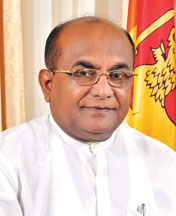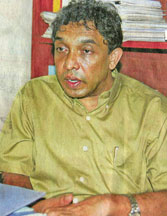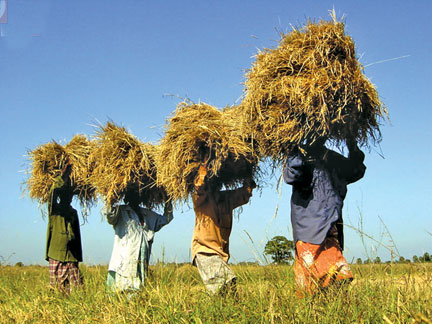Sri Lanka gears to face challenges of emerging food crisis
by Lalin Fernandopulle
"Several measures have been taken to develop agriculture and increase
food production to face the global food crisis", said Minister of
Agriculture Mahinda Yapa Abeywardena.
 |
 |
Minister
Mahinda Yapa Abeywardena |
Prof. Sirimal
Abeyratne |
He said there is no need to panic as there are adequate stocks of
paddy and added that the price of rice will not be increased.
He said maize cultivation has been affected and import permits have
been issued to meet the requirement of animal feed.
The country needs around 225,000 tons of maize a year and around
15,000 tons a month for animal feed.
Large extents of paddy land and animals were destroyed by the recent
floods. Estimates revealed that around 157,000 hectares of paddy, 45,000
hectares of field crops, 5,000 hectares of vegetables and around 100,000
animals had been washed away by the incessant rains in the East.
"We have taken steps to provide four bushels of seed paddy per
hectare and field crop seed for half a hectare free. Rs. 4,000 will be
given per acre of land to affected farmers", Abeywardena said.
The government launched one million home garden units under the
Gewathuwagawa program to boost agriculture to reach self-sufficiency in
food.
"The program will help increase agricultural production and provide
additional income to households", Abeywardena said.
Senior Lecturer, Department of Economics, University of Colombo,
Prof. Sirimal Abeyratne said that food inflation is a global problem,
and certain local factors have worsened it.
He said there is a short-term supply shortage in many parts of the
world due to bad weather and climatic conditions.
"There are long-term demand factors causing a rapid increase in the
need for agriculture produce particularly due to the rise in demand for
bio-fuel and food from emerging economies", he said.
Prof. Aybeyratne said however, Sri Lanka's food inflation is
significantly higher than that of the region, which is a result of
domestic and global factors.
Inflation which has been below five percent rose to mid single digit
this year following the escalation of world and local food prices.
The price of basic staple food has risen sharply in less than a year:
rice by 74 percent, soya 87 percent and wheat by 130 percent.
"Food prices are usually high during the early part of the year due
to seasonal factors. A large part of production was also destroyed by
bad weather conditions", Prof.Abeyratne said.
The recent floods swept vast swaths of paddy land and killed
thousands of animals.
 Official estimates revealed that the country lost around 20 percent
of the harvest due to the catastrophic weather that wreaked havoc to
farm land. Official estimates revealed that the country lost around 20 percent
of the harvest due to the catastrophic weather that wreaked havoc to
farm land.
Around 26 people were killed and 300,000 were displaced by the freak
weather that lashed across the East and Northern parts of the country.
The actual loss to property is yet to be estimated.
Prof. Abeyratne said that the food market has deep rooted weaknesses
under which producers and consumers are at a disadvantage due to
unprofessional practices along the value chain.
Market manipulation by traders has turned out to be a major problem
causing a huge burden on consumers who are at the mercy of exploiters.
Hoarding of stocks to boost prices, non-display of price tags and
exploitation by middlemen are common today.
"Domestic economic policies also contribute to higher long-term
general inflation of the country. The impact of food inflation is
widespread across the country and most importantly the impact on
interest and exchange rates affect long-term economic growth, investment
and trade", he said.
However, the negative repercussions of higher inflation on the
economy are difficult to quantify and identify as the link between
inflation and macroeconomic variables is less explicit.
The more explicit impact is on the living standards of the people and
poverty reduction.
"Is Sri Lanka geared to face global food inflation and sustain
economic growth" has been a key concern among economists and analysts.
Analysts believe that Sri Lanka is sitting on a volcano that could
erupt any moment provided drastic measures are taken to increase food
production and mitigate the impact of climate change.
Prof. Abeyratne said that Sri Lanka has been doing so much but all
seems to be aimed at deriving little benefit at a high long-term cost.
When the market is weak there is a justification for government
involvement but it should be to improve the market.
"Diverting development strategies and government resources to uplift
the standard of domestic agriculture is needed but it is not the
long-term solution for high food inflation. The long-term solution is
rapid economic growth which translates into high income on which the
country can improve its capacity to face the challenges of high food
prices", he said.
The Food and Agriculture Organisation has cautioned that the shortage
of food and its soaring prices which is a growing reality in many
countries could encompass the world within the next year or so.
The looming global food crisis has taken the world by storm with many
emerging countries grappling to survive the severe shortage of food and
sky-rocketing commodity prices.
The recovery of the global financial crisis and rise in domestic
consumption in merging economies have led to a sharp rise in commodity
prices.
World food production has been affected by adverse weather conditions
across the globe. Brazil and Australia which contribute a major share of
the world food production have been affected by extreme weather
conditions.
Prof. Abeyratne said countries that are affected most by the world
food crisis are poor agricultural countries. Agriculture's share in the
USA is only one percent of the GDP but it is four times higher than the
GDP of Sri Lanka.
"Despite rhetoric Sri Lanka is among the top 10 countries according
to population density and therefore expansion of agricultural land is
not an option for the country. Urban concentration without congestion is
suitable to promote agricultural production by protecting the country's
forest and wildlife", he said.
The rise in world oil prices fuelled by the turmoil in the Middle
East and Libya are also major contributors to the surge in global food
prices.
Oil prices rose above US$ 105 a barrel last week with speculation
that supply to OPEC from Libya, an oil rich country would be reduced
sharply.
Estimates suggest that around 25,000 people die daily by hunger, a
crisis that has grown due to shortage of food and rise in prices.
Violent protests against rising food prices are threatening peace and
stability in many countries in Asia and South America. Protests led by
left parties in South India urged the government to slash food prices
and assure a stable price for commodities.
|

